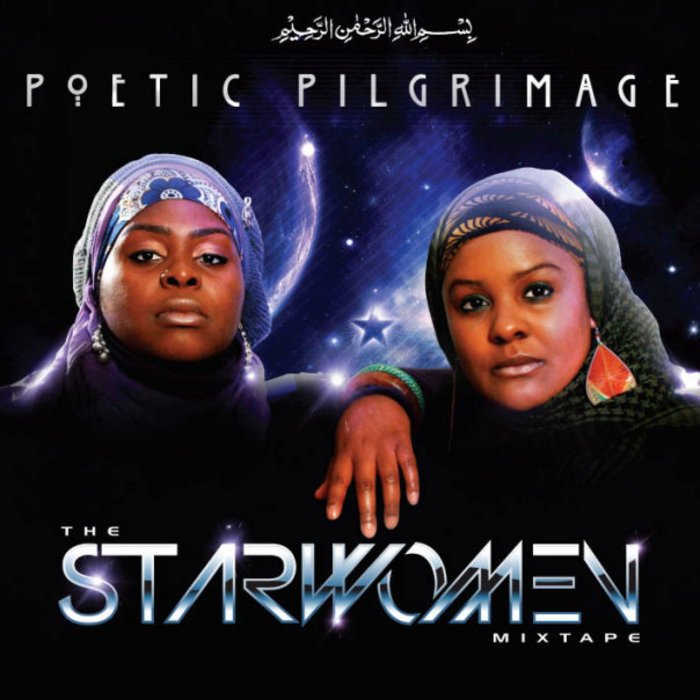INTERVIEW WITH UK’S POETIC PILGRIMAGE – PART 1
While attending the Urban Voices 2014 music festival in Stockholm, Sweden, Freedom Beat interviewed the festival’s performing artists about their music, the political atmosphere in their respective countries, music of nonviolent resistance, and how their own music engages these issues.
The Women of Poetic Pilgrimage by Ben Herson
Imagine two female MCs taking to the stage decked out in hijabs, covered from head to toe in an array of kaleidoscopic skirts, dangling earrings and cloaked in a mélange of multicolor shawls and fabrics. This is Poetic Pilgrimage: a female, Muslim hip-hop duo from Bristol, UK. Muneera Rashida and Sukina Abdul Noor were born in Bristol to Jamaican parents and have performed together under the Poetic Pilgrimage moniker since 2003. In their early days, Rashida and Noor were the darlings of London’s poetry circuit. Over the years they have found themselves at the vanguard of UK’s burgeoning Muslim hip-hop scene.
As one of the most well-known and respected Muslim hip-hop groups in this global niche, Poetic Pilgrimage has a difficult role to play as cultural ambassadors of their religion. On one hand, they must contend with stereotypical Western perceptions of Islam in mainstream media: representations that often depict violence and terror as the archetypal elements of the religion. The second challenge they face, as two women who put their images and voices into the public sphere, is the pressure from within their religion to conform to female cultural expectations.
Music and the arts can be used to combat stereotypes. Hip-hop in particular has risen over the past decade as a musical form and artistic medium with the rare ability to serve as a cultural conduit, which translates across a variety of different cultures and religions. “Hip-hop is easily adaptable to nearly any cultural context,” Greg Schick, Managing Director of Nomadic Wax and Founder of World Hip Hop Market, said. “Almost all cultures have some kind of tradition or poetic form that is similar to hip-hop: one that combines a basic rhythm track with spoken word, song or poetry.”
Poetic Pilgrimage’s Muneera Rashida echoed Schick’s sentiments when she discussed her love for hip hop, , “It is a tool that has given many people the opportunity to express themselves in a direct and creative manner. Art in general surpasses layers and aims straight from the heart,” Rashida said “Hip hop…has given those with no way to express their social conditions a means to speak and be noted…it is something that is accessible to all people regardless of class or financial status. It gave life to a new type of creativity, and has provided opportunity for growth and business… now that hip hop has gone international, this has only added texture to the many layers within it.”
While some conservative branches of Islam consider music to be haram (forbidden), Poetic Pilgrimage views it as a way to serve Allah, “For us [making music] isn’t problematic as we don’t follow the opinion that music is haram,” Rashida said.“Being raised with a Caribbean cultural backdrop and being exposed to Jamaican history and, of course, reggae music, in my opinion this is a perfectly acceptable and even complimentary art form to express messages of God, love, and social justice.”.
Noor estimates that the response from the Muslim community is about 50/50.
“Some people love and celebrate our presence and are so grateful for female representation within a creative context, others loathe what we do completely,” Noor said. “I’ve found forums with six pages worth of criticism towards us! It’s hard but it makes you stronger.”
In spite of the fact that within their religious community, feelings about their work as female rappers can be mixed, in the US they are embraced by diverse audiences. “Outside of the Muslim community the response has been very positive,” Noor said. “I think because our perspective is new, unique, courageous but fresh and we make sure we give it our all and not ride of the fact that we’re girls with Hijaabs but we actually have skills to back it up.”
In 2009 Nomadic Wax, booked a tour for Poetic Pilgrimage at a handful of colleges and universities throughout New England.
(Poetic Pilgrimage on the Road with Nomadic Wax Circa 2009)
On this tour I had the opportunity to see firsthand the kinds of strides that Poetic Pilgrimage are making in improving the perceptions of Islam among American audiences. Rashida and Noor’s presence had a profound impact on the hundreds of college students for whom they performed and facilitated workshops.
Most recently, Poetic Pilgrimage spent a week at Berklee College of Music where they worked with Berklee songwriting and production professor Dan Cantor, conducting workshops and concerts for the students.
“My students were mesmerized by their commitment to their poetry, their total lack of pretense and their natural gift for making everyone feel welcomed and appreciated for their contributions and efforts,” Cantor said. “They were remarkable at handling questions about their religion, race and cultural background. They carry a level of sensitivity, humor and self-knowledge about subjects most students and most people are scared to broach. In their musical and political world it’s vital to keep these dialogues alive and personal.”
Ben Herson is an internationally celebrated social entrepreneur, educator and media producer. In 2001, Herson founded Nomadic Wax: a media and educational events organization that uses music, film and the arts to promote issues of social importance and cultural exchange. He is also the senior series producer for the globally acclaimed MTV film series “Rebel Music” a multi part documentary series about the intersection of music, youth and social change from around the world. Herson has been interviewed on NPR, BBC, Billboard Magazine and the New York Times for his work.



